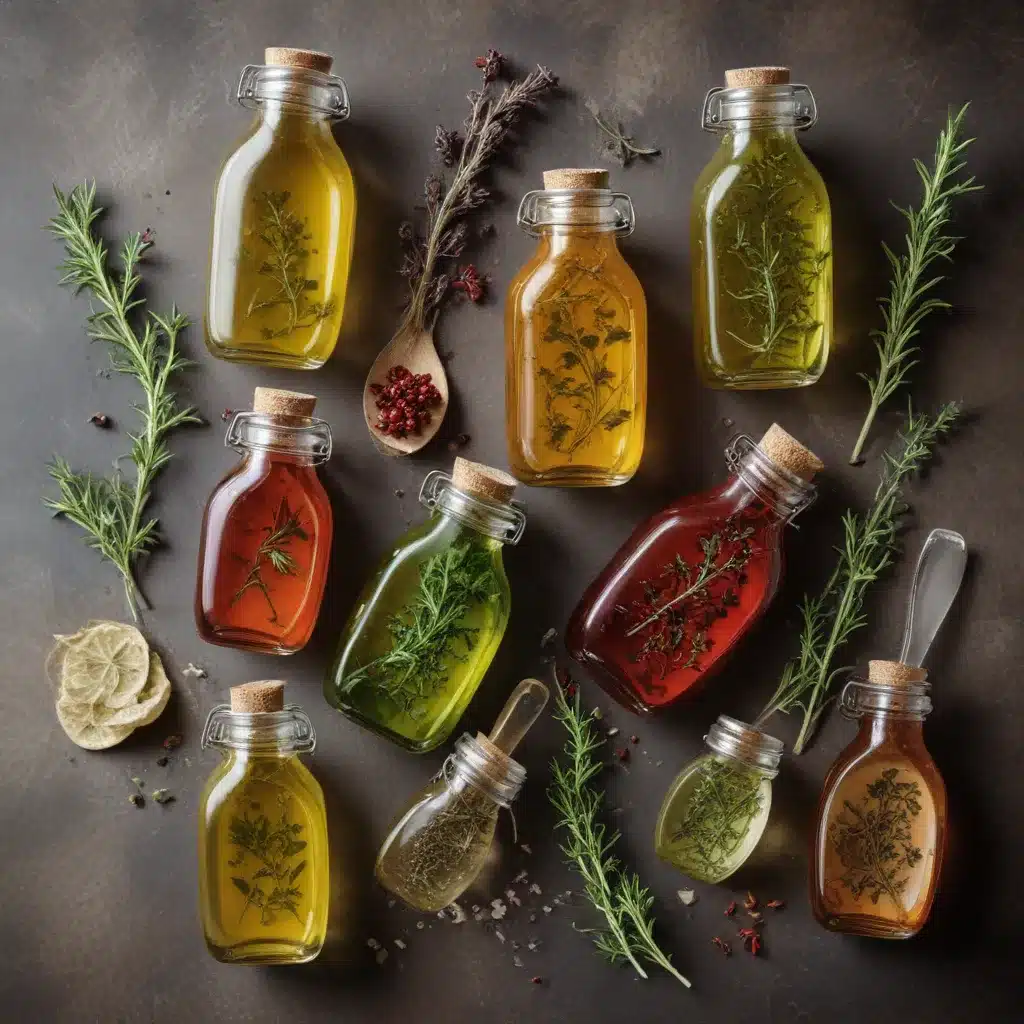
Delectable Dehydrated Delights: Homemade Herb-Infused Oils, Vinegars, and Condiments
As a farm educator at Crooked Pines, I’m often asked about preserving the abundance of fresh herbs, fruits, and vegetables that grace our fields and gardens. One of my favorite ways to capture and savor the flavors of the season is by creating a variety of herb-infused oils, vinegars, and condiments. These delectable dehydrated delights not only add depth and complexity to your cooking, but also provide a wholesome way to enjoy the bountiful harvest long after the growing season has ended.
Herb-Infused Oils
Olive Oil Infusions: To make your own flavorful herb-infused olive oil, simply add fresh or dried herbs of your choosing to a clean glass jar. Common options include rosemary, thyme, basil, oregano, or a Mediterranean blend. Cover the herbs with high-quality extra virgin olive oil, ensuring they are fully submerged. Cap the jar, label it with the contents and date, and allow it to infuse in a cool, dark place for 2-4 weeks. The longer it steeps, the more intense the flavor will become. Strain the oil through a fine mesh sieve before transferring to a clean bottle for storage.
Flavored Coconut Oils: For a tropical twist, try infusing coconut oil with herbs and spices. Dried lemongrass, ginger, turmeric, and kaffir lime leaves make a lovely combination. Gently heat the coconut oil to liquefy it, then add the dried ingredients. Allow it to steep for 2-4 weeks before straining and bottling. This infused oil is perfect for sautéing, roasting, or drizzling over finished dishes.
Garlic-Infused Oils: Homemade garlic-infused oil is a kitchen staple that adds incredible depth of flavor. Thinly slice or mince fresh garlic, then submerge it in a high-quality olive or avocado oil. Let the mixture steep for 2-4 weeks, then strain the oil and store it in a clean bottle. Use this versatile condiment for marinades, dressings, or to elevate any savory dish.
Herb-Infused Vinegars
Balsamic Vinegar Infusions: The rich, sweet notes of balsamic vinegar pair beautifully with herbs like rosemary, thyme, and sage. Simply place the fresh or dried herbs in a glass jar and cover with good quality balsamic vinegar. Allow it to infuse for 2-4 weeks, then strain and transfer the flavorful vinegar to a clean bottle.
Apple Cider Vinegar Infusions: For a more tart and acidic base, try infusing apple cider vinegar with herbs like oregano, basil, or even spicy peppers. The pungent flavor of the vinegar stands up well to robust herbs and can enliven salad dressings, marinades, and more.
Red Wine Vinegar Infusions: Herbaceous flavors like tarragon, rosemary, and basil mingle exceptionally well with the bold, tangy profile of red wine vinegar. Experiment with different combinations to create custom vinegars that elevate your culinary creations.
Herb-Infused Condiments
Homemade Herb Salts: Dehydrate fresh herbs like rosemary, thyme, or oregano, then finely grind them and mix with high-quality sea salt. The aromatic, flavor-packed salt can be used to season meats, vegetables, baked goods, and more. Store in an airtight container for up to 6 months.
Herb-Infused Mustards: Create custom mustard blends by infusing Dijon, whole grain, or spicy brown mustards with dried herbs, spices, or even fruit preserves. The possibilities are endless – try pairing honey mustard with dried dill and garlic, or a beet-horseradish mustard with caraway seeds.
Herb-Flavored Honey: Infuse raw, unprocessed honey with fresh or dried herbs for a delightful sweetener to drizzle over baked goods, cheese plates, or to enjoy by the spoonful. Lavender, rosemary, and lemon balm make especially lovely honey infusions.
Dehydration Techniques
Proper dehydration is key to creating shelf-stable, flavor-packed herb-infused oils, vinegars, and condiments. There are several effective methods to consider:
Oven Dehydration: Spread herbs or other ingredients in a single layer on a parchment-lined baking sheet. Set the oven to the lowest temperature, typically 135°F, and check frequently until completely dry and brittle, about 4-8 hours.
Air Drying: Tie herbs in small bundles and hang them in a warm, dry, well-ventilated area out of direct sunlight. This slow-drying process can take 1-2 weeks, but retains excellent flavor and aroma.
Dehydrator Methods: Using a food dehydrator, arrange ingredients in a single layer on the trays and dehydrate at 95-115°F for 4-12 hours, depending on the thickness and moisture content of the material.
Flavor Pairing
When crafting your own herb-infused creations, consider complementary flavor profiles to achieve the most delectable results.
Complementary Herbs: Pair delicate herbs like tarragon, chervil, or lemon balm with robust flavors like rosemary, thyme, or sage. Herbs with similar growing seasons or origins also make excellent combinations.
Spice Blends: Enhance your infusions with spices like black pepper, fennel, coriander, or star anise. The warmth and complexity of spices can wonderfully elevate the natural herbaceous notes.
Fruit and Herb Combinations: For a touch of sweetness, try infusing your oils, vinegars, or condiments with dried fruits like cherries, apricots, or figs. The fruity notes will beautifully balance the herbal flavors.
Storage and Shelf Life
When bottling your homemade herb-infused creations, ensure proper sterilization of all containers and utensils. This will help extend the shelf life and prevent unwanted microbial growth.
Proper Bottling Techniques: Wash and thoroughly dry all glass jars or bottles before use. For oils and vinegars, leave at least 1/2 inch of headspace to allow for expansion. Cap tightly and store in a cool, dark place.
Refrigeration Recommendations: While many herb-infused products can be stored at room temperature, refrigeration is recommended for best quality and food safety, especially for items containing fresh ingredients.
Shelf-Stable Duration: Properly stored, herb-infused oils generally have a shelf life of 3-6 months, while vinegars and condiments can last 6-12 months or longer. Always inspect for any signs of spoilage before use.
Crafting your own herb-infused oils, vinegars, and condiments is a rewarding way to savor the bounty of the season and elevate your culinary creations. With a little preparation and patience, you can enjoy these delectable dehydrated delights well into the colder months. Happy preserving, Crooked Pines Farm friends!


